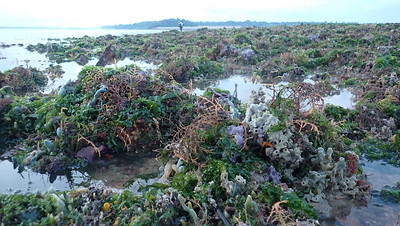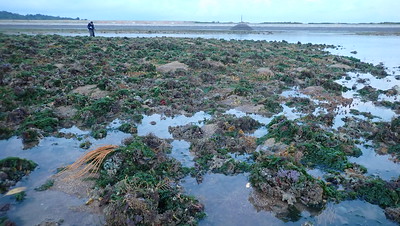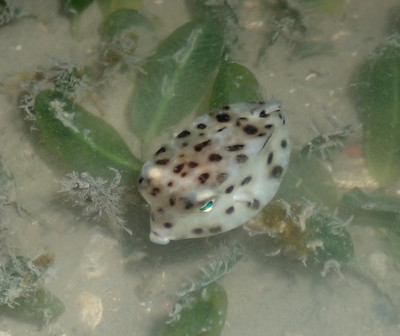The patch rich with delicate colourful animals is still there, but the patch seems smaller with every annual visit. Seagrasses are even more abundant as much of the shore has become very soft and silty. Most of the hard corals I saw were pale and some were bleaching.
The richest reefy corner of this shore looks sad today. Is it changing into a more seagrassy than reefy shore?
While there was still a good variety of sponges dotting the shores, they were no longer as abundant. Many were also not 'fresh and clean' - they were covered in sediments, but were still alive. Nudibranchs eat sponges and while I didn't come across any, the rest of the team did see some interesting ones.
As on our last survey in Jul 2020, a large area of the flats from the low water to the mid water mark was covered with dense growths of only Yellow bumpy sponges. Very few other sponges were seen among them. But I no longer saw large areas heavily coated in Melted chocolate sponge.
The most abundant cnidarian remains Button zoanthids which still cover large areas of the flat, very densely in some parts.
There was an alert to possible mass coral bleaching in early June, and sightings of some sick corals at Kusu Island recently, and some bleaching at Chek Jawa yesterday. Today at Beting Bronok, I saw about 40 small to medium sized Boulder pore corals. Most had pale portions on the top, with healthy brown in the lower portions. Only a few were outright bleaching. Clearly, something is stressing the corals, but not yet to the point of mass coral bleaching.
Other cnidarians that I saw today include many Spiky flowery soft corals, a few Ball flowery soft corals and some Pink flowery soft corals. I only saw a few small sea fans: Candelabra sea fans and one Asparagus sea fan. In the soft silty areas there were many Flowery sea pens, various cerianthids, a few Glass anemones. There were also many Swimming anemones. The Stinging hydroids were still plentiful.This shore used to be rich in echinoderms. These seem to be fading away. It seems every year, we see fewer and fewer echinoderms. Much less today compared to our survey in Jul 2020, which is already fewer than in Jul 2019 and in Jun 2018. I didn't see any Biscuit sea stars, but did see a small orange Cake sea star, a Spiny sea star and a Painted sand star. Kok Sheng saw one Knobbly sea star. I saw a few Thorny sea cucumbers, some Orange sea cucumbers, and some Smooth sea cucumbers. We saw no sea urchins.A tiny Shortnose boxfish made my day! I also saw one two Noble volutes laying egg capsules, while Chay Hoon saw a Baler snail. I saw some flatworms as well as other small critters common on our reefy shores.
The rest of the team saw several Estuarine seahorses
Seagrasses have taken over large areas of Beting Bronok where a deep layer of sediments have settled. Spoon seagrasses (large leaf blades) grow lush and fresh and green (no epiphytes) on most of the southern parts of flats. This is similar to our survey in Jul 2020 and Jun 2018, and better than what I saw in Jul 2019 when they were heavily covered in ephiphytes. I also came across sprinkles of Hairy spoon seagrass in the centre of the flats. I did see small patches of them too in Jul 2020, Jun 2018 and Jun 2017. I noticed a mild bloom of Sea lettuce (Ulva) in Jul 2020. Today, Sea lettuce still entangled many clumps of sponges and corals.Today, I couldn't do the usual real-time post to say 'Good morning, I'm awake at an ungodly hour in a godforsaken place' because I lost my signal. It was that close to our national boundary. So here's a sunrise shot. Thanks to Chay Hoon for organising the trip.
Beting Bronok remains a pale shadow of itself. This is what the shore looked like in years past...
 |
| Seemed to show some recovery, Jul 2020 |
 |
| Not very lively, Jul 2019. |
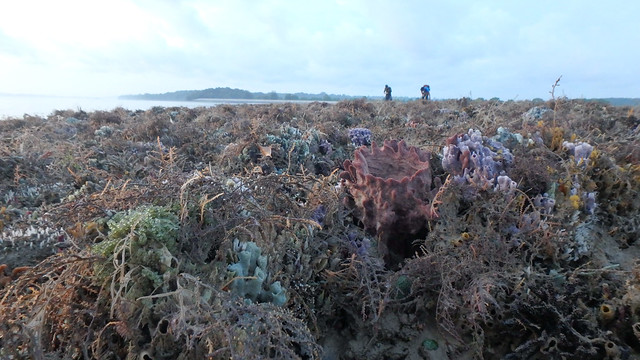 |
| Some signs of recovery in Jun 2018. |
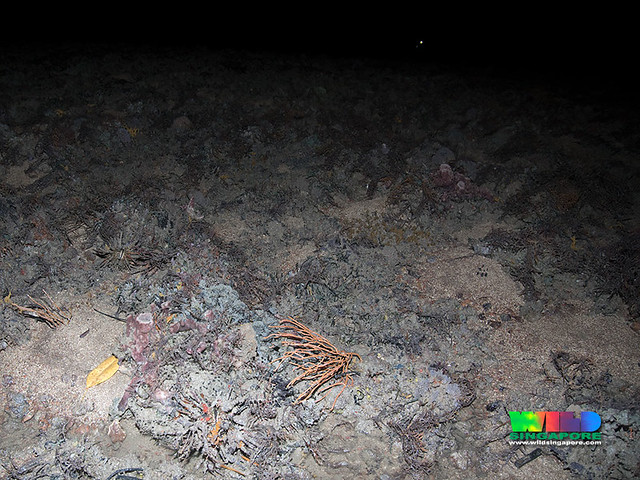 |
| A bit more marine life in 2017. |
 |
| Growths of marine life in Jun 2016. |
 |
| Mostly zoanthids only on the shore, Aug 2015 |
 |
| Marine life on at Beting Bronok in 2014 |
 |
| Marine life on Beting Bronok in 2013. |
 |
| Colourful marine life at Beting Bronok in 2012. |
 |
| Beting Bronok in 2012. |
Here's what Beting Bronok looked like ten years ago in 2003.
 |
| Beting Bronok in 2003. |
 |
| Beting Bronok in 2003. |
There used to be a wondrous variety of sea fans.
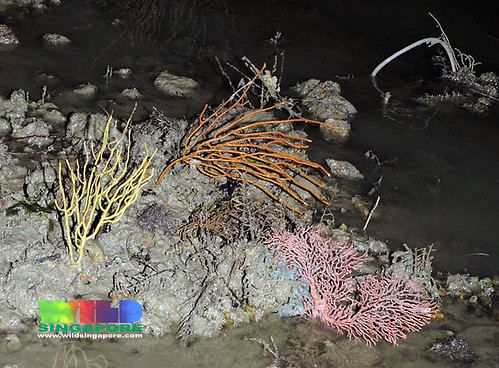 |
| Sea fans on Beting Bronok in 2004. |
Here's more old photos of marine life at Beting Bronok. Lost forever probably are the wonderful Sunflower mushroom corals and other corals that we used to see here.
Where is Beting Bronok? What is its status and future?
When the 2030 landuse plan by the Ministry of National Development was announced, it was also announced that Beting Bronok and Pulau Unum have been granted 'Nature Area' status. As I understand it, this status means the area "will be kept for as long as possible until required for development". Here's an earlier about 'Nature Area' status seem to mean.
To me, Beting Bronok seems to be in steady decline since the reclamation started at nearby Pulau Tekong . It has since also been affected by the flooding that led to mass deaths at Chek Jawa in 2007, and the coral bleaching in 2010 and a ferry ran aground on Beting Bronok in Jul 2011. Development of Pengerang Johor for a petrochemical complex that was rejected in Taiwan for environmental and health reasons can also impact Beting Bronok.
Now, with massive reclamation at Tekong, we can only hope for the best for this wonderful reef on our Northern shore.
Photos by others on this trip
Jonathan Tan
Jianlin Liu
Loh Kok Sheng
Others on this trip: Toh Chay Hoon
Other shores surveyed today
James Koh checked up on Pasir Ris, also on flickr

